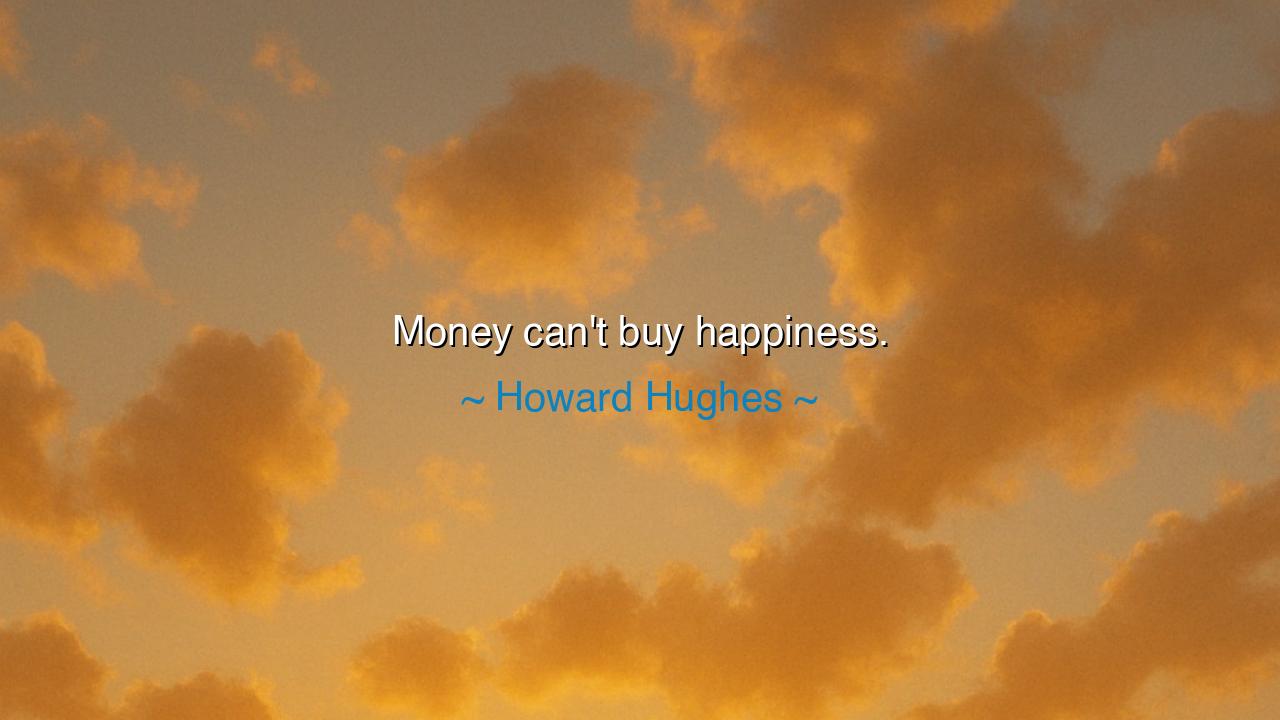
Money can't buy happiness.






The reclusive titan Howard Hughes, once among the richest and most powerful men in the world, uttered a truth that time itself cannot diminish: “Money can’t buy happiness.” These words, simple as stone yet heavy as destiny, were not born from the mouth of a philosopher or a monk, but from a man who had tasted every pleasure, conquered every ambition, and still found himself empty. His fortune was vast, his fame unmeasured, yet his heart was a desolate kingdom. Through his own life, Hughes became the very proof of his own warning: that wealth without peace is a golden cage, and that no coin, however bright, can purchase the quiet joy of a free and contented soul.
The origin of this truth lies not only in Hughes’ personal downfall, but in the very nature of human desire. Hughes was a man of vision—an aviator who defied the skies, a filmmaker who bent art to his will, a businessman who reshaped industries. But with each victory came not satisfaction, but hunger. His money brought him power, but not rest; pleasure, but not fulfillment. As his riches grew, so too did his fear, his isolation, his mistrust of the world. In his final years, locked away in dark rooms, afraid of light, of people, and even of himself, Hughes lived as a prisoner of his own success. It was then that his words—“Money can’t buy happiness”—ceased to be mere observation and became prophecy.
The wisdom of these words is ancient. The sages of every age have whispered them in different tongues, from the dusty scrolls of the East to the marble halls of the West. Epicurus, the Greek philosopher, taught that happiness lies not in possession but in moderation. The Buddha renounced his palace, his gold, his silks, and found enlightenment beneath a tree. Even Solomon, the richest of kings, confessed that all his wealth was vanity, a chasing after the wind. And yet, generation after generation, humankind returns to the same illusion—that joy might be bought if only one had more. Hughes, like so many before him, learned too late that money can fill the hands, but never the heart.
Consider the story of Howard Hughes beside that of Mother Teresa. One possessed endless riches and lived in solitude and fear; the other, clothed in simplicity, walked among the poorest of the poor, her heart radiant with compassion. She owned almost nothing, yet she was rich beyond measure in happiness. The contrast between them is not meant to shame, but to reveal: that joy does not come from what one holds, but from what one gives. The soul is nourished not by possessions, but by love, purpose, and the peace of living in harmony with one’s conscience.
And yet, Hughes’ words carry more than warning—they carry hope. For if money cannot buy happiness, then happiness is not limited by wealth. It is a treasure that belongs equally to the poor and the powerful, to those who labor and those who lead. The one who can find beauty in a morning breeze, gratitude in a simple meal, or contentment in honest work has discovered what kings and magnates so often miss. To realize this is to reclaim freedom—the freedom from endless striving, from the hunger that no feast can satisfy.
But to live by this wisdom requires courage. For the world whispers a different gospel: that success is measured by possessions, that worth is proven by wealth. To reject this illusion is to walk against the current, to find joy in simplicity while others chase shadows. It demands that one look inward, not outward, for meaning—that one learns to value moments more than objects, relationships more than riches, and peace more than power. The soul that can say “enough” has already stepped into the kingdom of true wealth.
So, my child, remember the words of Howard Hughes, not as the lament of a broken man, but as the counsel of one who saw the truth too late. Let them be your safeguard against the glittering lies of the world. Seek not money, but contentment; not abundance, but balance. Use wealth if it comes, but never serve it. Let your heart be rich in gratitude, your spirit generous, and your joy rooted in the eternal things—love, virtue, and the quiet wonder of being alive.
Thus, the legacy of Hughes’ wisdom endures: that happiness is not a commodity, but a condition of the soul. It cannot be traded, stored, or measured, but only lived. Those who understand this walk lightly through the world, their hearts unburdened by greed, their lives illuminated by peace. For the poorest man who knows contentment is richer than the king who owns the world, yet cannot smile.






AAdministratorAdministrator
Welcome, honored guests. Please leave a comment, we will respond soon